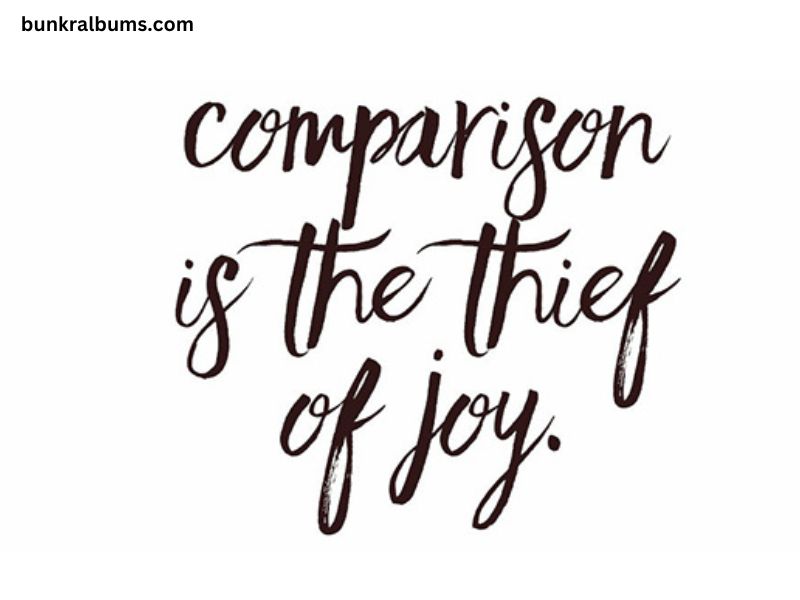Comparison Is the Thief of Joy As human beings, we have an innate tendency to compare ourselves to others. Whether it’s comparing our careers, relationships, physical appearances, or material possessions, the urge to measure ourselves against our peers is a natural part of the human experience. However, this constant Comparison Is the Thief of Joy can have a detrimental impact on our overall happiness and well-being.
In this article, we’ll explore the psychology of Comparison Is the Thief of Joy, the dangers it poses, and practical strategies for overcoming the comparison trap. By understanding the root causes of this behavior and learning to cultivate self-acceptance and contentment, we can reclaim our joy and live more fulfilling lives.
Understanding the Psychology of Comparison Is the Thief of Joy
Comparison Is the Thief of Joy is a deeply ingrained cognitive process that has evolved to help us navigate our social world. When we compare ourselves to others, we’re essentially seeking to understand our own worth and status within our social networks. This process is driven by a combination of evolutionary, psychological, and societal factors.
Evolutionarily, Comparison Is the Thief of Joy served as a survival mechanism, helping us assess our relative strengths and weaknesses in order to secure resources and mates. Psychologically, Comparison Is the Thief of Joy is often fueled by feelings of insecurity, low self-esteem, and a need for external validation. Socially, the constant barrage of curated social media content and cultural messaging reinforces the idea that we should strive to be better than those around us.
The Dangers of Comparison Is the Thief of Joy
While Comparison Is the Thief of Joy may have served a purpose in our evolutionary past, in the modern world, it can be a significant source of distress and unhappiness. When we compare ourselves to others, we often focus on their perceived strengths and successes, while overlooking our own unique talents and accomplishments.
This can lead to a range of negative consequences, including:
- Decreased Self-Esteem: Constantly feeling inferior to others can erode our sense of self-worth and confidence, making it difficult to appreciate our own unique qualities and achievements.
- Envy and Resentment: Comparing ourselves to others can breed feelings of envy and resentment, which can damage our relationships and hinder our personal growth.
- Anxiety and Depression: The constant pressure to measure up to societal and peer expectations can contribute to increased levels of anxiety and depression.
- Procrastination and Lack of Motivation: Comparison Is the Thief of Joy can make us feel discouraged and less motivated to pursue our own goals and dreams, as we may feel that we’ll never be as successful or accomplished as those around us.
- Missed Opportunities: By focusing on what we lack rather than what we have, we may miss out on valuable opportunities for personal growth and fulfillment.
The Negative Effects of Comparison Is the Thief of Joy on Mental Health
The psychological toll of constant comparison can be significant, leading to a range of mental health challenges. Individuals who engage in frequent comparison are more likely to experience symptoms of depression, anxiety, and low self-esteem.
The stress and negative emotions associated with comparison can also have physical consequences, such as increased cortisol levels, disrupted sleep patterns, and weakened immune systems. Over time, this can lead to a decline in overall health and well-being.
How Comparison Is the Thief of Joy Can Hinder Personal Growth and Success
In addition to the mental and emotional toll of Comparison Is the Thief of Joy, it can also impede our ability to achieve personal growth and success. When we’re constantly focused on how we measure up to others, we may become paralyzed by self-doubt, fear of failure, and a lack of confidence in our own abilities.
This can prevent us from taking risks, pursuing our passions, and embracing new challenges that could lead to personal and professional fulfillment. Instead of striving to be the best version of ourselves, we may find ourselves in a never-ending race to keep up with those around us.
Overcoming the Comparison Is the Thief of Joy Trap: Strategies for Cultivating Self-Acceptance and Contentment
Recognizing the dangers of Comparison Is the Thief of Joy is the first step towards reclaiming our happiness and well-being. By adopting a more mindful and self-compassionate approach, we can learn to break free from the comparison trap and embrace our unique journey.
Practicing Gratitude and Celebrating Your Own Achievements
One powerful way to combat the negative effects of comparison is to cultivate a sense of gratitude for your own life and accomplishments. Take time each day to reflect on the things you’re grateful for, whether it’s your health, your relationships, or the small victories you’ve achieved.
Celebrate your own successes, no matter how big or small, and resist the urge to downplay your achievements. Acknowledging your hard work and progress can help you build a stronger sense of self-worth and confidence.
Building a Positive Support Network to Combat Comparison Is the Thief of Joy
Surrounding yourself with a supportive network of friends and loved ones who lift you up, rather than tear you down, can be a game-changer in overcoming the comparison trap. Seek out individuals who encourage you to be the best version of yourself, rather than those who fuel your insecurities.
Engage in activities and hobbies that bring you joy and fulfillment, and surround yourself with people who share your passions. This can help you shift your focus away from comparison and towards the things that truly matter to you.
Embracing Uniqueness and Focusing on Personal Goals
Ultimately, the key to overcoming the Comparison Is the Thief of Joy trap is to embrace your own uniqueness and focus on your personal goals and aspirations. Recognize that you are one-of-a-kind, with your own set of strengths, weaknesses, and life experiences.
Rather than striving to be like someone else, set your sights on becoming the best version of yourself. Identify your core values and align your actions with them, and don’t be afraid to forge your own path, even if it’s different from those around you.
Cultivating Self-Compassion and Finding True Happiness
At the heart of overcoming the Comparison Is the Thief of Joy trap is the ability to practice self-compassion. When you catch yourself engaging in negative self-talk or feeling inadequate, take a step back and treat yourself with the same kindness and understanding you would extend to a loved one.
Remember that you are human, and that everyone experiences setbacks and struggles. By embracing your imperfections and treating yourself with compassion, you can break free from the cycle of Comparison Is the Thief of Joy and find true, lasting happiness.
Conclusion
Comparison Is the Thief of Joy is a natural human tendency, but it doesn’t have to be a constant source of unhappiness and discontent. By understanding the psychology behind this behavior and adopting strategies to overcome the comparison trap, we can reclaim our joy and focus on living our best lives.
Ready to break free from the Comparison Is the Thief of Joy trap and cultivate true happiness? Download our free guide, “The Art of Self-Acceptance: Practical Strategies for Overcoming Comparison and Finding Contentment.” This comprehensive resource will provide you with the tools and insights you need to embrace your uniqueness, celebrate your achievements, and discover the path to lasting fulfillment.







